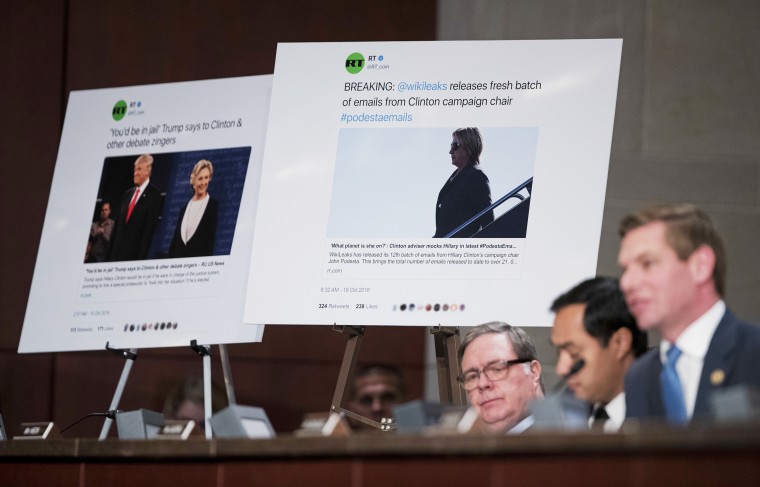Tech titans Facebook, Google, and Twitter have been roundly criticized by lawmakers for their role in allowing American voters to be swayed by Russian propaganda before and during the U.S. presidential election — yet the question remains as to who should prevent such influence in the future. And such a responsibility won't come cheap, or easy. For a company such as Twitter, which has yet to even turn a profit, absorbing the costs of self-regulation could be debilitating.
Facebook CEO Mark Zuckerberg already noted that his company's investments in security will impact its profitability. Facebook is planning to double its spending next year, and a portion of those costs will be spent on bolstering its security operations such as adding another 10,000 people and increasing efforts around technological solutions.

Related: In Wake of Russia Probe, Twitter Is Launching an Ad Transparency Center
But while Facebook reported $10.3 billion in revenue this past quarter, Twitter lost $21 million.
"They [Twitter] do have more limitations than the other companies, and one reason they haven’t done a lot in the past is with the pressure from Wall Street to grow users to increase revenue," a former Twitter employee told NBC News.
"If the choice is between spending money on things that will drive revenue or spend money on things that make policymakers happy but have no impact on the end user, they prioritized shareholder responsibility," the person said.
The cost of compliance
Experts agree that dealing with this problem will undoubtedly come at a cost to these companies. After Facebook's blockbuster earnings report, the company's stock was down 2 percent on the news that Facebook will ramp up its spending for 2018.
And while Facebook and Google certainly have the money to hire more staff to make a dent in the problem, Twitter is facing more of a challenge. It's worth $14.57 billion — a sliver of Facebook's $520 billion, and a galaxy behind Google parent company Alphabet's whopping $719.45 billion valuation.
Yet what Twitter lacks in resources, it compensates with its responses: It has often been the first to announce new measures to self-regulate, and last month introduced an Advertising Transparency Center, where people can see who's behind an ad, why they were targeted, and what other ads the person is running. Political advertising will also be clearly labeled with who is paying for it. Facebook followed suit a few days later, announcing similar measures. Google also said it would identify who is behind a political ad.
The self-regulation comes as Congress is considering the Honest Ads Act, which would require broadcast-style disclosures on political advertisements.
"We can't have foreign involvement," Darrell West, founding director of the Center for Technology Innovation at Brookings, told NBC News. "There will be costs to the companies — but they have to protect the integrity of the system."
Bots, bots, bots
Twitter has long faced questions about its bot problem — the internet term for a spam account.
According to Sean Edgett, acting general counsel, bots make up less than 5 percent of the accounts on Twitter. However, a report from the University of Southern California and Indiana University estimates 9 to 15 percent of active Twitter accounts are bots.
The problem with Twitter is that when one account is suspended, it's easy to create another, said Mark Jacobson, a Georgetown professor and former senior adviser in the United States Department of Defense.
Twitter doesn't disclose all of its methods for combating bots, out of concern it could tip off the trolls, but it does use signals such as looking at where an account has registered, whether it is coming from a Russian IP, or is registered with a Russian phone number. Edgett also said the social platform is getting better at using signals from suspended accounts to link them to new ones that may pop up in what has become a game of whack-a-mole.
"We’re challenging 4 million accounts every week to determine if they’re real. We take down and block 450,000 suspicious log-ins every day," Edgett said. " So we’re making a concerted effort to stop this type of activity on the platform."
So who should regulate?
While last week's hearings left many questions unanswered, experts agreed the process represented the first big step for the tech companies as they figure out how to tackle this newfangled problem the Founding Fathers never could have predicted.
"[These companies] should listen to what Congress has to say and not just assume Congress wants to regulate them," said Jacobson. "And they should engage in discussions about how to do this without destroying their business model."
"The government has taken a hands-off approach for the last several decades — but there is growing interest in addressing particular problems," West told NBC News. "There could be congressional legislation, executive action, or legal remedies."
However, as Senator Mark Warner pointed out, "The U.S. government has thus far proven incapable of adapting to meet this 21st century challenge. Unfortunately, I believe this effort is suffering, in part, because of a lack of leadership at the top. We have a president who remains unwilling to acknowledge the threat that Russia poses to our democracy."
Ultimately, perhaps the biggest question that remains is whether an administration that relishes tweeting and regulatory rollbacks will be aggressive in cracking down on social media platforms.